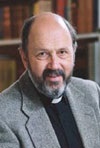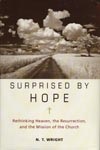Skill Builders
Article
A Review of N. T. Wright's "Surprised by Hope"
Surprised by Hope: Rethinking Heaven, the Resurrection, and the Mission of the Church
by N. T. Wright
New York: HarperOne, 2008

Heaven has always been the focus of hope for those who follow Christ. But if N. T. Wright is correct, many of us who have fixed our hope on heaven have missed the point. Wright is Bishop of Durham for the Church of England and the controversial New Testament scholar who is arguably most famous for his assertion that Protestants have misread Paul's theology of righteousness and justification. In this book Wright takes aim at the Christian understanding of life after death. His goal is to correct as much as it is to inform. He contends that people inside the church are as confused about what the Bible teaches regarding the resurrection and the life to come as those outside the church.
The author complains that many Christians grow up assuming that whenever the New Testament mentions heaven, it refers to a place that is relevant only after death. Instead, he argues, heaven is a present reality. "Heaven, in the Bible, is not a future destiny," Wright proposes, "but the other, hidden, dimension of our ordinary life—God's dimension, if you like" (p. 19).
At times it is hard to see how Wright's position differs from old fashioned postmillennialism. However, he rejects what he calls "the myth of progress," and the idea that "the human project, and indeed the cosmic project, could and would continue to grow and develop, producing unlimited human improvement and marching toward a utopia." He calls this utopian ideal "a parody of the Christian vision" (p. 82). The problem with this myth of progress is that it cannot explain the presence of evil in the world. The alternative to this false hope is the gospel message of Christ's real victory over evil and his bodily resurrection, resulting in a kind of "marriage" between heaven and earth.
According to Wright, when the Bible speaks of heaven, "it is not talking about two localities related to each other within the space-time continuum or about a nonphysical world contrasted with a physical one but about two different kinds of what we call space, two different kinds of what we call matter … ."(p. 115) The ultimate proof of this is in the ascension: "What we are encouraged to grasp precisely through the Ascension itself is that God's space and ours—heaven and earth in other words—are, though very different, not far away from one another" (p. 116).
This image of the juxtaposition of heaven and earth is compelling. Heaven is not so far away that our voice will not carry. It is closer than we think, as close as the risen Savior, who sits at the Father's right hand and pleads for us.
Dispensationalists (such as I) will be understandably disappointed by Wright's characterization of their eschatology as "an American obsession" and "a highly distorted interpretation" of Christ's Second Coming that has blinded its adherents to their responsibility as stewards of God's creation (p. 119). Dispensational preachers, however, have always considered the "blessed hope" to be a strong incentive for personal holiness and responsible living.
Even if we reject some of Wright's conclusions, this book is still a valuable reminder of the centrality of the gospel to the church's preaching. If we are tempted to ignore Wright's critique because of our theological differences, perhaps we should accept his challenge to preach the hope of the gospel in a way that reflects a more expansive definition of mission, one that includes justice and stewardship as well as evangelism and offers living proof of a renewal that is yet to come.
John Koessler is professor and chair of the Pastoral Studies Department at Moody Bible Institute in Chicago, Illinois.











